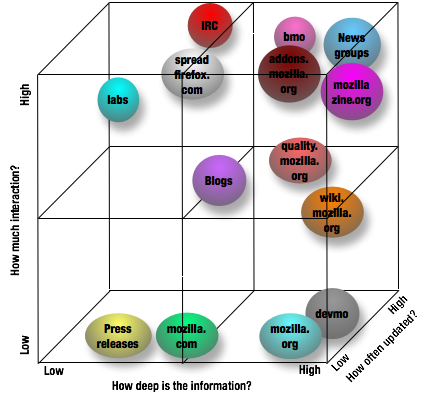Mozilla communication toolkit
Excerpt reposted from my Mozilla blog
A MAP
I've built a rudimentary grid in 3 dimensions to indicate how I understand the Mozilla communications toolkit. Precision isn't intended here, nor value judgments ('high' and 'low' don't equal 'worth'). Take the various positionings of our communication channels as approximations, not fixed. Definitely room for improvement, but I wanted to start a discussion about this. It's a bit complicated.
Here's a narrative map of how we communicate, and how you can enter the grid.
Press releases. The closest thing we have to official statements, with a primary focus on product release news, partnership announcements, and significant events. We develop these internally at Mozilla Corporation with our PR agency. Mozilla Europe and Mozilla Japan also generate from time to time press releases that are specific to Europe and Japan. Get this content at www.mozilla.com/en-US/press, www.mozilla-europe.org/en/press and www.mozilla-japan.org/press.
End user web sites. Polished product information designed to introduce potential new users to Mozilla software and encourage download and usage of same. Parallel sites for end users in the US, Europe and Japan, with more to come this year (China is up next). Get this content at: www.mozilla.com, www.mozilla-europe.org and www.mozilla-japan.org.
Blogs. Two primary aggregators: planet.mozilla.org and feedhouse.mozillazine.org. Feeds at planet are added at the discretion of the module owners. Planet is the primary collection of blog content from Mozilla developers and, lately, marketers. You can view the content at planet or feedhouse through any modern feed reader.
wiki.mozilla.org. The workhorse for product development, planning, and collaboration. The site of record for Firefox 3 feature definition. View content at: wiki.mozilla.org.
developer.mozilla.org. The definitive resource for Mozilla developer documentation. Resources for people contributing directly to Mozilla projects, and for developers interested in building add-ons or working with Web standards. View content at: developer.mozilla.org.
quality.mozilla.org. Mozilla quality assurance team's site for sharing community news and updates of Mozilla testing with the world. Visit quality.mozilla.org.
www.mozilla.org. The historic home of the Mozilla project. Some parts are out of date and have migrated to wiki.mozilla.org, developer.mozilla.org, and mozilla.com, but much content remains. Prior to the introduction of mozilla.com with the launch of Firefox 1.5, mozilla.org served a dual purpose as the home of both developer and end user content. A bit adrift at the moment, and in need of more attention to streamline and de-confuse visitors. Visit at www.mozilla.org.
labs.mozilla.com. Mozilla Labs blog, forum and portal for our ongoing software experiments. Visit at labs.mozilla.com.
spreadfirefox.com. The community marketing hub for Firefox. Primarily a group blog at the moment, but soon to be revamped with a much stronger project focus. Visit at www.spreadfirefox.com.
IRC. One of the key ways a distributed, global software project gets work done. Developer-focused. See available channels and learn more here: irc.mozilla.org. You'll need special client software to connect to IRC, which stands for Internet Relay Chat.
bugzilla.mozilla.org. Think of it as the key project management tool for Mozilla software. BMO, as it's known, is an open bug tracking system that enables group collaboration to diagnose software problems, assign responsibility, and track resolution. Anyone can create a free account and start reporting bugs with our software and web sites. Visit at bugzilla.mozilla.org.
addons.mozilla.org. Both an end user and developer resource. For end users, the sole whitelisted provider of software add-ons that extend the functionality of Firefox. For developers, the place where they can upload the add-ons they have created for review and introduction to a worldwide audience of Firefox users. Visit at addons.mozilla.org.
mozillazine.org. The primary resource for support for end users of Mozilla products. Completely independent of Mozilla Corporation. Also provides independent Mozilla news and hosts the blogs of several Mozilla project contributors. Visit at www.mozillazine.org.
Newsgroups. Usenet newsgroups originated with the Internet and are one of the earliest methods of group communication enabled by the Internet. Because of the versatility of access options, longevity and record keeping function of newsgroups, many open source projects, including Mozilla, use them to serve as the permanent record of many policy and project decisions. Access Mozilla newsgroups through a dedicated newsreader or on the Web via Google Groups. Here's a listing of active Mozilla newsgroups: www.mozilla.org/community/developer-forums.html.
